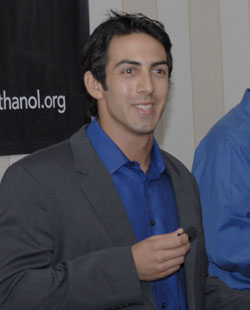 Amidst the hustle and bustle of race weekend events, I caught up with EPIC board member Don Endres of VeraSun Energy, a producer of fuel grade ethanol. Don said the Indy Racing League’s switch to 100 percent ethanol fuel is history in the making. He said the IRL’s investment in the fuel not only demonstrates to the world that ethanol is a trusted renewable fuel source that promotes a cleaner environment, but that it’s also a high-performance fuel with benefits surpassing those of gasoline.
Amidst the hustle and bustle of race weekend events, I caught up with EPIC board member Don Endres of VeraSun Energy, a producer of fuel grade ethanol. Don said the Indy Racing League’s switch to 100 percent ethanol fuel is history in the making. He said the IRL’s investment in the fuel not only demonstrates to the world that ethanol is a trusted renewable fuel source that promotes a cleaner environment, but that it’s also a high-performance fuel with benefits surpassing those of gasoline.
[audio:http://www.zimmcomm.biz/epic/endres-don.mp3]
Don broke down industry projections for the growth of ethanol. He said the fuel currently accounts for just 4 to 5 percent of the fuel stream today. America uses about 142 billions of gasoline annually and that figure is growing by about a percent and a half a year. The Energy Information Administration estimates that by 2050 the demand for gas will reach upwards of 163 billion gallons a year at a 10 percent ethanol blend. That means an annual demand of at least 16.3 billion gallons of ethanol by 2050.
Don said today, the ethanol industry is producing just 6 billion gallons annually and there is another 6 billion gallons of production under construction. He added that car makers are putting a significant number of flex-fuel vehicles into the consumer market, which can burn a higher grade ethanol blend, E85. With an estimated 2 million FFVs added to the market each year on top of the current 6 million already available, Don said the market for ethanol is set to expand well-beyond where it’s at today.
For Don, it’s still rather early in the game. He added that the concentrated push for domestically-produced fuel from America’s politicians not only reaffirm his projections for a vastly growing demand for ethanol, but help drive it.
 Here’s today’s winner of the Indy 500, Dario Franchitti at the post-race press conference. He seemed like the most amazed guy in the world for having run and we certainly congratulate him.
Here’s today’s winner of the Indy 500, Dario Franchitti at the post-race press conference. He seemed like the most amazed guy in the world for having run and we certainly congratulate him.

 This race today will go down as a strange one with all the cars running into the wall and the rain delay and then rain ending it early.
This race today will go down as a strange one with all the cars running into the wall and the rain delay and then rain ending it early. The race is back on after a lengthy delay due to rain.
The race is back on after a lengthy delay due to rain. Ethanol Team IndyCar Driver Jeff Simmons has held a top 3 position for much of the race. Just before the rain delay, Jeff held first place in the 91st Indianapolis 500. But, just as the Ethanol Team poster boy pulled into the pits to refuel, the yellow flag dropped pushing Jeff back to 7th. Indy Series officials are holding off on whether to call the race. With 113 laps completed, the race has progressed far enough to call the winner. As it stands right now, Tony Kanaan, Marco Andretti and Danica Patrick hold the top 3 spots.
Ethanol Team IndyCar Driver Jeff Simmons has held a top 3 position for much of the race. Just before the rain delay, Jeff held first place in the 91st Indianapolis 500. But, just as the Ethanol Team poster boy pulled into the pits to refuel, the yellow flag dropped pushing Jeff back to 7th. Indy Series officials are holding off on whether to call the race. With 113 laps completed, the race has progressed far enough to call the winner. As it stands right now, Tony Kanaan, Marco Andretti and Danica Patrick hold the top 3 spots. Well the weather cleared up in time for the Indy 500 to get started. Here’s Super Bowl MVP Peyton Manning waving the green “e” flag to start the race here this afternoon.
Well the weather cleared up in time for the Indy 500 to get started. Here’s Super Bowl MVP Peyton Manning waving the green “e” flag to start the race here this afternoon. The man that built The Ethanol Promotion and Information Council from the ground up is Board President Tom Branhan, CEO and general manager of
The man that built The Ethanol Promotion and Information Council from the ground up is Board President Tom Branhan, CEO and general manager of  Amidst the hustle and bustle of race weekend events, I caught up with
Amidst the hustle and bustle of race weekend events, I caught up with  The big story here in Indianapolis this morning has been the weather. It’s lightly raining now and the trucks are running the track to try to keep as much water off it as possible. You can’t race on a wet track.
The big story here in Indianapolis this morning has been the weather. It’s lightly raining now and the trucks are running the track to try to keep as much water off it as possible. You can’t race on a wet track. The keynote speaker at the EPIC reception was IndyCar driver Jeff Simmons. Jeff was in great spirits on the eve of the big race here in Indy. I’ve got the audio from his remarks to the group last night.
The keynote speaker at the EPIC reception was IndyCar driver Jeff Simmons. Jeff was in great spirits on the eve of the big race here in Indy. I’ve got the audio from his remarks to the group last night. One of the inventions of the Ethanol Promotion and Information Council is the “e”-tini, a very colorful martini. Actually there are 3 different ones and I’ll have to update this post to provide the details on them.
One of the inventions of the Ethanol Promotion and Information Council is the “e”-tini, a very colorful martini. Actually there are 3 different ones and I’ll have to update this post to provide the details on them.